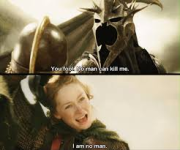StillStunned
Mr Sticky
- Joined
- Jun 4, 2023
- Posts
- 9,631
{I rewrote the bit that disappeared. Sorry for the confusion.]
Seek for the Sword that was broken:
In Imladris it dwells.
Recently I've been listening to the audiobooks of The Lord of the Rings, and it struck me just how accommodating this prophecy is. None of that cryptic "Cross the border and a great empire will be destroyed" - but we're not saying which one. Or even "I fear the Greeks, even when they bear gifts", when you could just as easily say, "Honestly people, who trusts this wooden horse that's conveniently large enough for a score of armed soldiers and toilet facilities?"
No, Tolkien hands out a quest, and conveniently provides the solution. The fate of Middle-Earth is at stake, after all. No point inviting confusion.
Fantasy (and sci-fi sometimes too) is full of prophecies and omens. And generally they're just plot drivers to get the hero/ine off their arse. They rarely seem to be actually useful to the protagonists. Usually they look back and go, "Oh right, we did that. Yay us."
Ask, sooner, mute stone to speak and voiceless rock to speak.
Quenched will be Dyrnwyn's flame;
Vanished, its power.
Night turn to noon
And rivers burn with frozen fire
Ere Dyrnwyn be regained.
This is from The Chronicles of Prydain. All these things come true, but the protagonists only realise this after the fact. None of the signs guide them in their quest.
In Memory, Sorrow and Thorn by Tad Williams, there's a prophecy that sets the action in motion. But (spoiler) in the end it turns out that the good guys shouldn't be following the prophecy. There's an omen saying "Beware the false messenger!" But finding out after three massive volumes what it all meant leaves the reader (this one, at least) feeling a bit deflated.
This is a rambling introduction to my topic: prophecies, omens and other puzzles in speculative fiction. How do other SF&F writers (other writes may chime in too, obviously) deal with it? Any thoughts on how they're used in mainstream fiction, either good or bad examples? Any examples from your own writing that you're proud of, particularly clever ones or poetic ones? Did you write the prophecy and then shape the story around it, or did you write the story and then go back and tailor the prophecy to what would happen? Did you wonder about the readers' reaction?
Now your statues are standing and pouring sweat. They shiver with dread. The black blood drips from the highest rooftops. They have seen the necessity of evil. Get out, get out of my sanctum and drown your spirits in woe.
Seek for the Sword that was broken:
In Imladris it dwells.
Recently I've been listening to the audiobooks of The Lord of the Rings, and it struck me just how accommodating this prophecy is. None of that cryptic "Cross the border and a great empire will be destroyed" - but we're not saying which one. Or even "I fear the Greeks, even when they bear gifts", when you could just as easily say, "Honestly people, who trusts this wooden horse that's conveniently large enough for a score of armed soldiers and toilet facilities?"
No, Tolkien hands out a quest, and conveniently provides the solution. The fate of Middle-Earth is at stake, after all. No point inviting confusion.
Fantasy (and sci-fi sometimes too) is full of prophecies and omens. And generally they're just plot drivers to get the hero/ine off their arse. They rarely seem to be actually useful to the protagonists. Usually they look back and go, "Oh right, we did that. Yay us."
Ask, sooner, mute stone to speak and voiceless rock to speak.
Quenched will be Dyrnwyn's flame;
Vanished, its power.
Night turn to noon
And rivers burn with frozen fire
Ere Dyrnwyn be regained.
This is from The Chronicles of Prydain. All these things come true, but the protagonists only realise this after the fact. None of the signs guide them in their quest.
In Memory, Sorrow and Thorn by Tad Williams, there's a prophecy that sets the action in motion. But (spoiler) in the end it turns out that the good guys shouldn't be following the prophecy. There's an omen saying "Beware the false messenger!" But finding out after three massive volumes what it all meant leaves the reader (this one, at least) feeling a bit deflated.
This is a rambling introduction to my topic: prophecies, omens and other puzzles in speculative fiction. How do other SF&F writers (other writes may chime in too, obviously) deal with it? Any thoughts on how they're used in mainstream fiction, either good or bad examples? Any examples from your own writing that you're proud of, particularly clever ones or poetic ones? Did you write the prophecy and then shape the story around it, or did you write the story and then go back and tailor the prophecy to what would happen? Did you wonder about the readers' reaction?
Now your statues are standing and pouring sweat. They shiver with dread. The black blood drips from the highest rooftops. They have seen the necessity of evil. Get out, get out of my sanctum and drown your spirits in woe.
Last edited:
